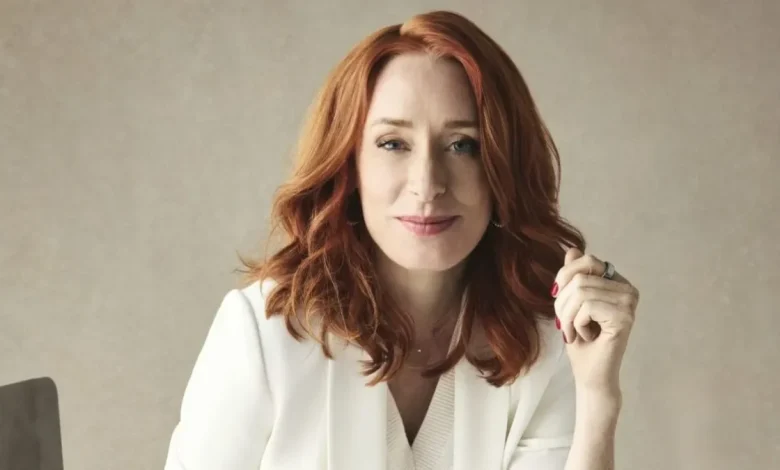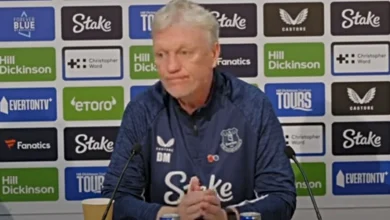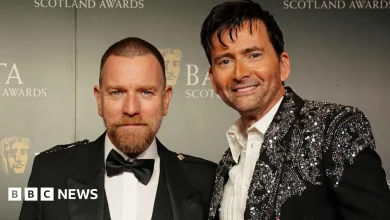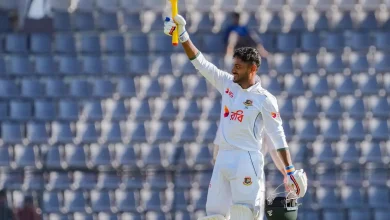Hannah Fry: ‘They called me a “nubile young woman”. F**k you, I’ve got three degrees’

In 2014, when Hannah Fry was a young professor of mathematics at University College London, she decided to try stand-up comedy. Or rather, she was cajoled into it by a friend who was running a comedy night in a pub. It is not the kind of thing that maths professors usually do.
“I didn’t really want to do it,” she says. “I tried to get out of it. But actually it went really well.” This taught her a valuable lesson: “I have this philosophy where I’d much rather try something and fail at it than never have tried.”
Fry’s “why not?” approach has served her well. The comedy night led to a viral TED talk on the mathematics of love, which led to the long-running Radio 4 show Curious Cases. A decade later, she is surely the UK’s leading populariser of science – in numerous books, documentaries, radio shows and podcasts.
She’s also hosted Have I Got News for You, appeared on Question Time, crunched the numbers for Channel 4’s general election coverage, written for the New Yorker and been resident scientist on Lauren Laverne’s 6 Music show, despite having minimal interest in music. “My friends thought it was hilarious. Every now and then Lauren would try to have a conversation about music and I’d have to pretend.”
It’s no surprise, then, that when Gary Lineker’s company Goalhanger wanted to add The Rest Is Science to its stable of high-end, celebrity-fronted podcasts, it went straight to Fry, who chose the US educator Michael Stevens as co-host. So that’s a wide-ranging, twice-weekly show exploring different aspects of the “wild mysteries” of science to add to the pile. “Yes, there’s definitely too much stuff,” agrees Fry. “But unfortunately there’s loads of interesting things to do.”
Fry, 41, is a bit of a unicorn: a doctor of mathematics who is also a natural communicator. She calls her style – a winning fusion of darting intelligence, sly humour, electric enthusiasm and a touch of cheerful glamour – “invitational”.
When we meet one afternoon at Goalhanger’s south London headquarters, she is no less engaging in person. Like all great specialist broadcasters, she combines curiosity with generosity. She gives the impression that she has just learned something fascinating and delightful and can’t wait to share it with you. In January, Cambridge University created a new job for her: Professor of the Public Understanding of Mathematics. “If you’ve got kids on TikTok and extremely posh people at Cambridge, you’re doing something that catches people’s imaginations,” she says.
One person, however, remains very hard to impress: her mother. “The Royal Society commissioned a portrait of me and they had this big unveiling,” Fry says. “It was ridiculous. I was like, ‘Mum, mum! Isn’t this amazing?’ And she was like” – she pulls an indifferent face – “‘Mmm, there’s a bit too much standing around.’”
After graduation, Fry studied for a PhD in fluid dynamics so that she could work for Formula One (Photo: Dr Hannah Fry)
Fry was reminded of this recently when she attended a talk by the philosopher Alain de Botton about parenting. He said there a few types of parents. The first love their children whatever they do. The second make their love conditional. Rarely do those children grow up to be successful people. “The third type are like, nothing you ever say or do will impress me,” she says. “That’s my family.”
She has two daughters herself, aged eight and six. Which type is she? “I asked my daughter and she said, ‘Oh, it’s the first one.’ There’s a bit of me that thinks, ‘Oh thank God.’ But then there’s another bit that thinks, ‘Does this mean I’ve doomed her to be a failure because she’s got nothing to prove?’ In the whole of human history, this is the first generation where we thought it might be a good idea to be nice to our children.” She laughs. “It’s an experiment that hasn’t yet reached its conclusion.”
Fry was destined to be an overachiever. She grew up in a working-class family on the border of Hertfordshire and Essex, the middle sister of three. Her late father was a factory worker, her Irish mother a housewife. Hard work was practically a religion. “It wasn’t even necessarily with a goal in mind,” she says. “I like to think it’s because of the Catholic mindset: life is suffering. You work because life is hard.” As a result, she says, “I wasn’t really going out. I wasn’t having boyfriends. I wasn’t drinking or hanging out in the park at ill-advised hours.”
What was she doing instead? “Learning how to do Rubik’s Cubes. Learning how to juggle. I don’t know really. Genuinely just reading.” She cringe-laughs. “I’m such a pathetic human, forgive me. I’ve always really loved existing in my own mind.” When she arrived at UCL to study mathematics, she says, there were some freshers who were already independent and worldly-wise. “And then you get people who grew up in the countryside and whose parents were really strict and they Lose. Their. Minds. That was definitely me.”
Hannah Fry & Vsauce (Michael Stevens) in ‘The Rest Is Science’ (Photo: Jessica Eliza-Ross/Goalhanger)
After graduation, Fry studied for a PhD in fluid dynamics so that she could work for Formula One, but she got her dream job when the science of racing was in a trough between innovations. “I got there and it was awful. It was so bad. I hated it and I lasted six weeks. The culture was horrible, the questions weren’t interesting. I’d missed the good bit by about 15 years. I happened to go at the moment when Formula One was going through a technical dip.” So she returned to academia. When she moved into broadcasting via her TED talk, she was initially anxious that her academic peers would be snobbish about her move away from research, but that hasn’t happened.
“I think mathematicians recognise that there is a big PR problem,” she suggests. “If there’s one subject that is an engine of prosperity, then it’s mathematics. And yet it’s the one that everyone’s been traumatised by. Maybe they can see that.” She laughs. “Or maybe they’re just whispering behind my back.”
She’s also outgrown snotty remarks from critics and online hecklers. “I remember the first time I read a comment that said I was boring, I cried for half a day.” One TV critic wrote that she had only been hired for one programme because she was a “nubile young woman”. “I thought, literally f**k you! I’ve got three degrees! I was genuinely upset for a couple of days.”
Fry has had bigger things to worry about. In 2021, she was diagnosed with cervical cancer and opted for a radical hysterectomy – a decision she regretted. The strain also precipitated the amicable end of her marriage to sports writer Phil Lythell. She dealt with it all by intimately tracking the process in her award-winning BBC Two documentary Making Sense of Cancer with Hannah Fry.
Making the film wasn’t easy (“The director was following me around saying, ‘How do you feel about your own death?’”) but intellectualising her ordeal helped enormously. “I don’t feel emotional about that journey now, not even a tiny bit, because I’ve thought about it so much.”
She also wanted to shine a light on how hard it is to make informed decisions about cancer treatment. “I think it’s pretty astonishing that you’re putting people who’ve just had this life-changing news in a position where they have to either sign over their autonomy to a doctor or sit through a statistics lesson,” she says. “It overwhelms people with information at a time when they already feel overwhelmed. Is this the best we can do?”
Fry thinks a lot about how scientists and medical professionals can improve the way they convey information to the general public by focusing on the people behind the numbers. “For a really long time, scientists have locked themselves away in their ivory towers and haven’t really bothered to communicate to people. And when they have bothered, it’s like, we know the answer and you silly people down there don’t understand.”
Interviewing people who refused the Covid vaccine for her 2022 show Unvaccinated convinced her of the importance of listening to people’s anxieties rather than just telling them they are wrong. “It’s no longer enough to just say, ‘Shh, this isn’t a problem.’” So did she changed anybody’s mind with her more empathetic approach? She smiles ruefully and whispers with theatrical confidentiality: “Did I f**k.”
Ah, well. If any branch of science currently has a comms problem, then it’s AI, the subject of Fry’s 2018 book Hello World: How to be Human in the Age of the Machine and a forthcoming BBC documentary. Thanks to the generative AI explosion, it can seem like a planet-wrecking, job-destroying disinformation machine rammed down our throats by rapacious tech barons. Fry, however, is more upbeat, provided the more responsible companies prevail (she doesn’t name them, but she hosts a podcast for Google’s DeepMind).
“Honestly, I’m still an optimist,” she says. “Sure, there are things that can go wrong and it’s really important to worry about them. But I also think phenomenal good is potentially on the horizon.” I must be pulling a sceptical face. “I promise I haven’t just drunk the Kool-Aid! Really, really positive things can happen.”
Fry takes her social responsibility seriously but, she says, she wouldn’t be doing any of this if it wasn’t fun. She’s like the teacher you wish you’d had, making challenging subjects feel like shared adventures. Maths, in particular, is still as exciting to her as it was when she was a sheltered teenager.
“It feels like a very physical exercise but it’s something that happens entirely in your mind,” she rhapsodises. “People imagine that mathematicians find the subject easy. It’s totally not true.” She leans forward. “Have you ever had that experience of doing a puzzle and really struggling with it and then you have a moment of clarity where it all slots into place? The feeling of delight is not just because you find an answer. It’s the fact you found it so hard that makes it so joyful.”
‘The Rest Is Science’ is available on YouTube and all podcast platforms. ‘The Infinite Explorer with Hannah Fry’ airs at 8pm on Mondays on National Geographic.





